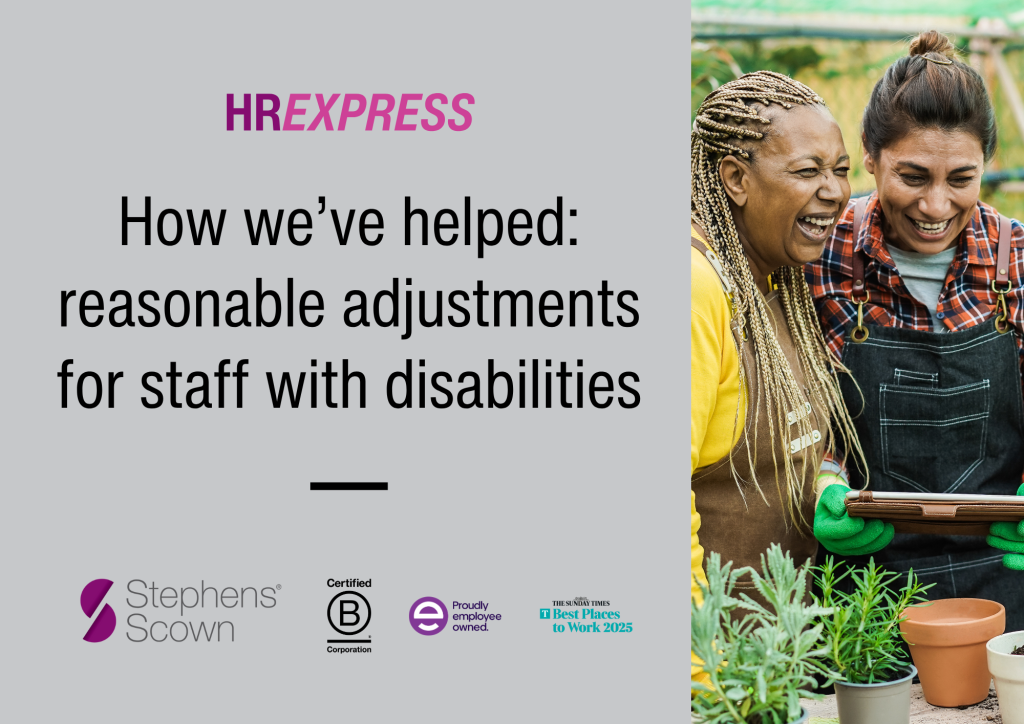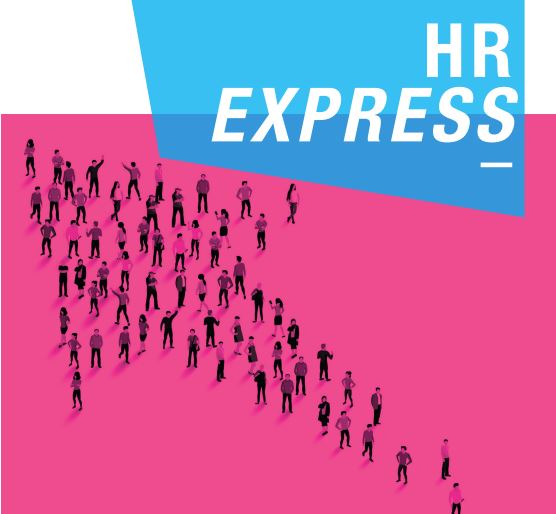
There are myriad reasons why it can benefit employers to proactively support employees with disabilities in the workplace. Beyond the legal framework of the Equality Act 2010, there are compelling cultural and ethical imperatives that call for inclusive, respectful and compassionate practices. Ethical HR leadership means creating a workplace where all individuals, regardless of ability, can thrive, contribute meaningfully, and feel valued.
On both sides of the employer-employee relationship this area can be delicate and often tricky to handle. Employees can feel uncomfortable and vulnerable disclosing personal information. Employers can feel uncertain about what they can ask and how best to approach their legal obligations.
When approached correctly however, introducing reasonable adjustments can be a “win-win” situation for all – empowering employees to fulfil their potential and perform at their best, whilst also feeling supported by their employer and reinforcing their employer’s commitment to equity and inclusion. The goal is not just compliance, but genuine understanding and support.
This article covers some frequent questions we receive from our employer clients including what are “reasonable” adjustments, how can these adjustments be introduced, as well as what to do if certain adjustments are not practicable and cannot be introduced.
Our goal in the HRExpress team is to break processes down step-by-step and to simplify issues as far as possible.
Hypothetical case study – John Smith
Let’s work through a potential real-world scenario that you could be faced with.
You are approached by an employee ‘John Smith’ who disclosed their disability to you. John is one of your gardeners and has a physically active role, with lots of lifting, bending, kneeling and long periods of standing. They explain the impact their condition has on them day-to-day and how it affects them in the workplace. What should you do?
The first crucial step for you to take as an employer is to make sure you fully understand John’s condition.
“An employee has disclosed they have a disability we didn’t know about. What now?”
Some employees can feel uncomfortable disclosing disabilities early on and they cannot be forced to disclose their illness or condition. It isn’t a legal requirement for them to do so.
When an employee does disclose a disability to you, it’s essential to respond with respect and discretion. Once you know an employee is disabled or reasonably ought to have known and they are placed at a substantial disadvantage as a consequence, your duty to make reasonable adjustments will be triggered.
In some cases, reasonable adjustments won’t be required. But, you must never assume this is the case, even if on the surface an employee appears to have been ‘coping’ in their job role.
In our case study, John has disclosed his disability to you. At the outset, some simple and easy steps to take in this situation could include:
- Meeting with John to confidentially and sensitively discuss the information they’ve disclosed.
- Taking a detailed note of the meeting.
- Discussing how John’s disability may be impacting them in the workplace and in doing so, showing interest in their disability so that you can learn more about it.
- Asking what, if any, additional support may be needed (in that meeting or otherwise).
- Understanding who they are comfortable disclosing their disability to (e.g. HR, line manager, colleagues).
Opening up dialogue in a confidential manner can help you fulfil your proactive obligations to identify, implement and then monitor reasonable adjustments. As soon as you have knowledge of an individual’s disability or reasonably believe an employee may be disabled, you must not avoid or ignore the topic. Communication is crucial; this should be a collaborative, not a transactional process. It’s about building trust and showing that you value the employee’s wellbeing and dignity.
Our HRExpress team helps guide employers on how to confidently navigate these sensitive conversations and consider when it could be appropriate to obtain third party support for adjustment recommendations (e.g. via an occupational health or GP report).
John’s Case Study
John’s role as a gardener involves lots of physical activity and he has explained to you that he experiences joint pain, limb mobility and back pain.
When supporting clients with considering reasonable adjustments previously we have guided them to work through the issues using a table, which can be a really helpful tool. The table should set out:
- What is the issue/challenge with work.
- What adjustments could you potentially make.
- Can you accommodate them and if not, why not.
Working this through with John, you might identify that you could:
- Build in ‘sit breaks’ if he finds it difficult to stand for a long time.
- Consider particular tools to assist him (e.g. to lift certain weights, ensure safe working, assist mobility, for comfort).
- Knee pads to help with kneeling and joint pain.
- Give consideration of the impact on travel to and from site.
“The Occupational Health provider has set out recommended adjustments for my employee, but they are not practicable or realistic in our business structure. What now?”
Disability is a protected characteristic under the Equality Act 2010 and claims for disability discrimination can be brought regardless of length of service.
Seeking medical input either from an employee’s GP or consultant or from an independent occupational health provider can be a very sensible step. It will usually be essential if you are contemplating any kind of formal action arising out of concerns around a disabled employee. That report will give you information about your employee’s health and improve your understanding of both the difficulties they may be facing and how you can support them in the workplace.
However, it is not enough to leave it at the report. It is what you do with that report which matters. In the first instance, you should meet with your employee and discuss the report and its recommendations with them.
“Do those recommendations tie into our legal responsibilities to our employee?”
Reasonable adjustments are workplace changes introduced to reduce and/or remove the disadvantages a disabled person may experience in the workplace.
Legally, the duty to make reasonable adjustments arises where a disabled person is disadvantaged by either a practice applied in the workplace, a physical feature of the employer’s premises or a failure to provide an auxiliary aid. Ethically, it’s about a commitment to fairness and equal opportunity. The duty should be considered once a disability is known about, whether that is during recruitment or the day-to-day working environment.
Examples of reasonable adjustments during recruitment may include providing:
- Interview questions in advance.
- Quiet focus spaces for tasks.
- Additional time to complete tasks.
- Pen and paper to take notes in the interview.
- Speech-to-text transcription function in an online interview call.
In a day-to-day working environment, examples of reasonable adjustments can look slightly different depending on the job role and may include:
- Adjusting premises (e.g. providing a ramp or moving furniture).
- Specialist ICT equipment (e.g. dictation, text-to-speech, sound-reducing headphones).
- Providing a quieter area to work.
- Offering flexible working arrangements (e.g. working hours allowing more breaks, days working from home, not working night shifts).
- Offering additional support in tasks.
- Modifying performance-related pay arrangements.
Inevitably, adjustments will vary from employee to employee and what you implement should be tailored to the individual, through listening actively and responding thoughtfully to their needs. Some adjustments will be more expensive than others but cost alone will rarely be a justifiable reason for not implementing an adjustment. The above is a useful starting point to give an idea of how they can arise, with more information available here.
If you are interested in learning more about supporting neurodivergent candidates or employees specifically, please see our other articles on:
- Dyslexia (Dyslexia Discrimination Case Law UK – Disability Discrimination – Stephens Scown)
- Neurodiversity (Mental health awareness: Neurodiversity in the workplace – Stephens Scown)
- Autism, ADHD and the definition of disability | Stephens Scown
- Invisible Disabilities & Mental Health at Work – advice for employers (stephens-scown.co.uk)
“What if we can’t implement the recommended adjustments?”
If the recommended adjustments aren’t practicable or realistic, don’t panic or immediately assume this will result in a disability discrimination claim. Instead, you should focus your efforts on exploring what alternatives are available (if any) that might also help. Some initial practical considerations could include:
- Keeping a schedule of the recommended adjustments, making notes against those you can adopt and those you cannot, with evidenced reasoning for the latter.
- Trialling an adjustment on a temporary basis. This will enable you to assess the impact on your workplace, see how feasible it is to implement them permanently and explore with your employee if the adjustment is beneficial.
- Assessing affordability by reviewing the cost of the recommended adjustment against company finances and team budgets.
- Discussing the available options with your employee and understanding what they feel would be most helpful.
- Compromising on proposed adjustments by partially implementing recommendations within the means of the business.
If it is not reasonable for you to make an adjustment, then you need to demonstrate that you have a clear and objective rationale for that decision. The reasoning must be sufficient to satisfy an employee and/or a Tribunal that the steps taken have been fair and reasonable under the circumstances.
Our HRExpress team often advises on how to approach recommended adjustments and find a workable plan which fits with your business or organisational structure. We are alive to the reality of business needs and understand that not all recommendations will be practical or affordable.
“What happens if I get it wrong?”
If you don’t approach this correctly, you may be exposed to a claim for disability discrimination. Within this context, either a prospective job applicant or an employee could argue in an Employment Tribunal there has been a failure to implement reasonable adjustments. Navigating the Tribunal process can result in substantial time, administrative and financial costs.
However, the support of our HRExpress service will limit the risk of you reaching that point. Unfortunately, claims do sometimes arise despite an employer’s best efforts and if that’s the case, our Specialist Litigation team would be available and on-hand to support you.
You can also find out more in our HRExpress brochure below:

